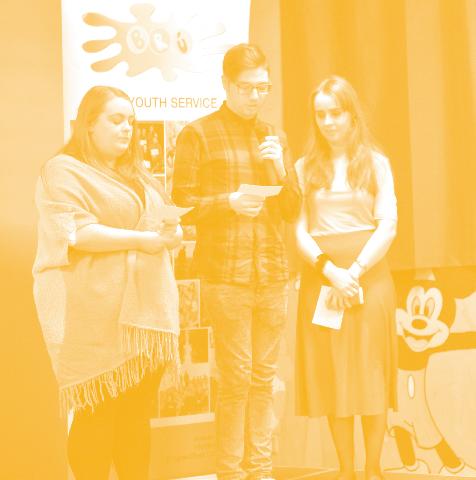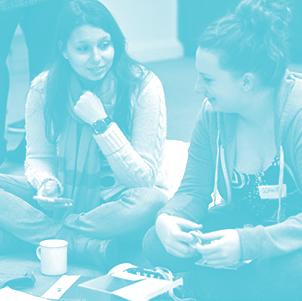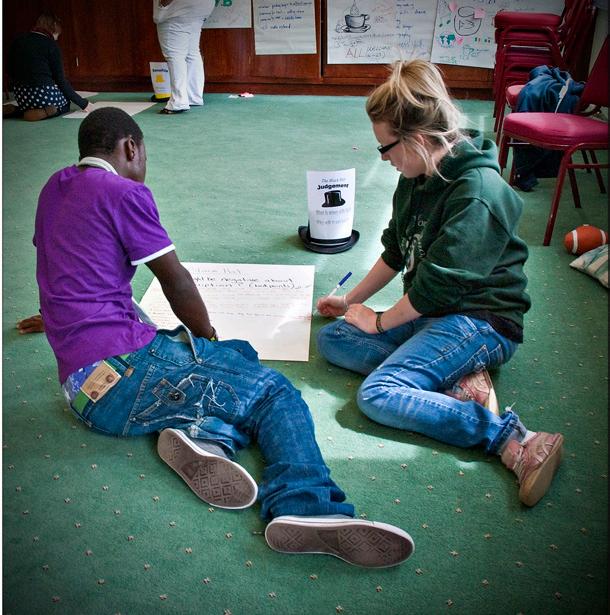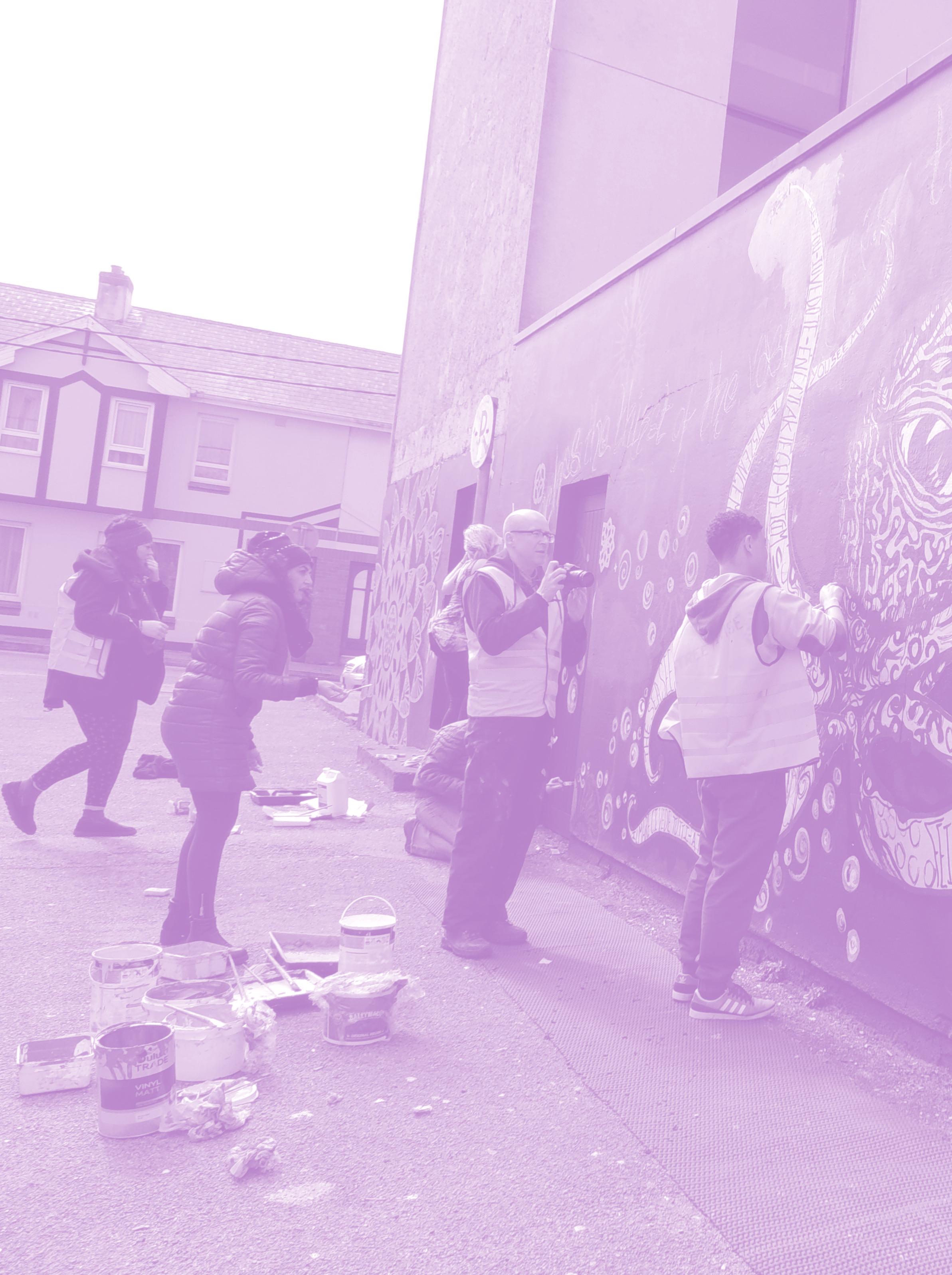
7 minute read
Planning Phase
Points to consider: There is a wide range of actions available to find the right partner(s). Investing time in finding the right partners will reap many benefits at later stages of the project.
Be prepared to withdraw if the partnership is not suitable. It is more important to get the partnership right than to proceed with an unsuitable relationship.
Advertisement
Check out the legitimacy of the partner to ensure they are a credible organisation.
Try to match interests and ethos of the participating organisations.
Develop and implement a contract agreement between all partner organisations - include the aims, objectives, activities, role of leaders, etc. in the agreement.
All partner agreements should include a commitment to the safety and welfare of the participants. This should also include the criteria for recruiting staff and volunteers to work on the project, such as vetting and police checks.
Have a ‘risk assessment’ checklist for the project planning visit (including accommodation, activities, leaders, legal requirements etc).
Partner Finding
There are many aspects to finding an international partner, and it can be difficult to find the perfect partner organisation to work with. Every organisation has its flaws and may have different ways of working that can cause frustrations and difficulties. When looking for a partner, it is important to set out your ‘non-negotiables’ so that your organisation’s values and ethos are not compromised and that the welfare of the participants is maintained as the highest priority.
Safeguarding questions to ask of potential partners:
Do they have any safeguarding policies or procedures? Are they willing to share them?
Do they have a code of behaviour that all workers need to abide by?
Do they have a process for managing complaints or concerns?
Do they take complaints seriously?
Is there a culture of openness and transparency when working in partnership with others?
How are workers in the organisation recruited and selected? Are they willing to cooperate with police checks if required?
Do they provide safeguarding training for their employees or volunteers?
Do they know what the safeguarding requirements are when operating in Ireland?

Are they willing to adhere to the safeguarding protocols for the project?
Recruitment and Selection (Workers/Hosts)
Recruiting and selecting the right workers and hosts for your project is crucial. Remember that where police checks are available and legal, they must be used for leaders and host families. The Vetting Bureau provides information and advice for all Garda vetting and Police checks. Information is available from https://vetting.garda.ie
Selecting Host Families
Placing young people in host families provides fantastic opportunities for immersion into the culture of the host country. However, host family situations can raise additional risks that need to be managed.
Points to consider: ≥
Who is living in the family home and who may be in contact with the participants.
Meet with the host families in person if you can. Visit their home and look at what the living arrangements are. If the sending organisation cannot do this, request that the host organisation carries out these checks.
Consider the make-up of the family and why they wish to host participants.
Does the local organisation have a working relationship with the host family? What previous interaction has there been?
Are the host family willing to take part in formal meetings to discuss the project and their role in hosting the participants?

Accommodation
An Advance Planning Visit (APV) is strongly recommended. When an APV is done right it is one of the most effective means of addressing safeguarding. Consult the relevant National Agency for guidance on holding an APV.
If an APV cannot be carried out, there may be other options available through thorough planning processes.
If the project involves working with host families, make sure they are aware of the organisation’s Child Protection Policy.
Screening of host families is essential. Carry out police checks if available. Visit the host family and have them complete an application form. It’s also advisable to check references.
Give placement details to participants and their families at least four weeks in advance of the exchange. This facilitates contact between the participants and the host family in advance of the visit.
Provide a briefing for host families. Give a copy of the whole programme. Be clear on responsibilities. Give host families emergency contact details.
In the case of non-homestay accommodation, check out the accommodation on the planning visit and ensure that it is acceptable.
In the planning stage, carry out a thorough review of the proposed sleeping arrangements for participants.
Check potential health and safety issues in relation to accommodation. Check who will be staying at the venue at the time of the visit, and if facilities will be shared with other groups.
Ensure that the accommodation caters for gender balance and diversity requirements.
Ensure that leader accommodation is appropriate.
All leaders must have a rooming list that details where participants are accommodated.
Have a clear contract with accommodation providers to ensure the welfare of the participant.
Roles and Responsibilities
Appoint a key leader so there is a named person managing the project. Ensure that this person’s contact details are known to the relevant stakeholders.
Ensure that the lead organisation has allocated the required leadership resources so that the project is delivered safely.
Ensure that all leaders are recruited in accordance with this guidance resource, legal requirements and your organisation’s policies and procedures.
Ensure gender and age appropriate balance among leaders.
Leaders should be given clear roles and responsibilities, and be inducted into their roles so they fully understand what is expected of them.
Leaders should understand and respect the participants at all times.
Leaders should be made aware of their duty of care to participants and the need to protect their welfare.
Ensure that leaders are appropriately qualified for activities that require additional training (rock climbing, water sports etc).
At least one leader should have first aid training.

Planning the Programme
Plan debriefing sessions on a regular basis with the participants. This may be daily, weekly or monthly depending on the project. This is particularly important for group projects and projects where participants take part on their own, such as study visits.
Projects with unstructured programmes should still have sufficient boundaries and good monitoring in place. It is important to achieve a healthy balance between encouraging participants’ independence and protecting them from undue risk.
Leaders should have a clear schedule that includes breaks and time off. Fatigue can create an unhealthy environment that may lead to unnecessary stress and anxiety.
Planning Emergency Procedures
Have a clear emergency plan, including: 24/7 contact details for host and home country; emergency procedures if an evacuation is needed; an emergency fund; and knowing where participants and leaders are at all times.
Have a back-up plan if the programme needs to change for any reason.
Agree the first aid protocols in advance of any activities or events.
Make sure there is a lead person appointed for health and safety procedures.
Anticipate an emergency – this is one of the best ways to manage it. The planning phase provides a platform to ensure participants are safeguarded even during emergencies.
Travel Preparations
Ensure that each participant has a passport that is within at least six months of its expiry date.
Visas and/or additional travel documents may be required for some participants.
Consult the Citizens Information Service and/or Department of Justice and Equality for specific guidance on the country the participant is travelling to or coming from.
Participants under 18 need signed consent from parents or guardians to be brought out of Ireland and/or into other countries.
If a participant is travelling with staff or volunteers from the organisation, be prepared to explain the working relationship with the participant to passport control staff.
General Policies & Procedures
Ensure there is adequate and appropriate insurance for all stages of the project, including the planning visit and any other follow up activities.
Give clear guidance on how personal information will be used and what level of confidentiality exists. Abide by good data protection practices and agree how to manage the data with the partner organisations. This includes photos, video, registration details, social media posts, etc.
Ensure a good training and preparation programme for participants, which should include the development and agreement of contract and ground rules for all participants.
Training should also include information on cultural awareness, safety and well-being, and relationship building.



